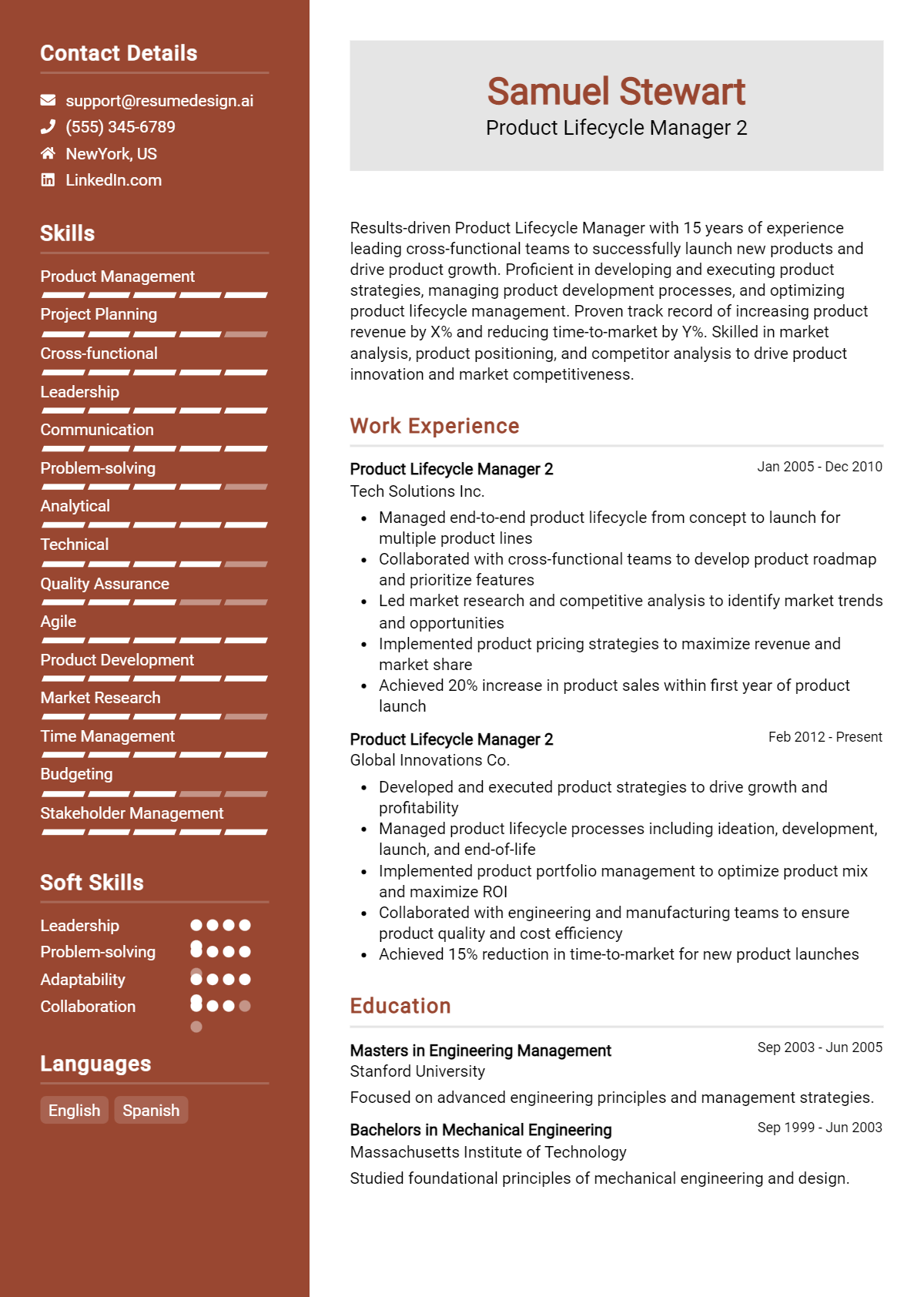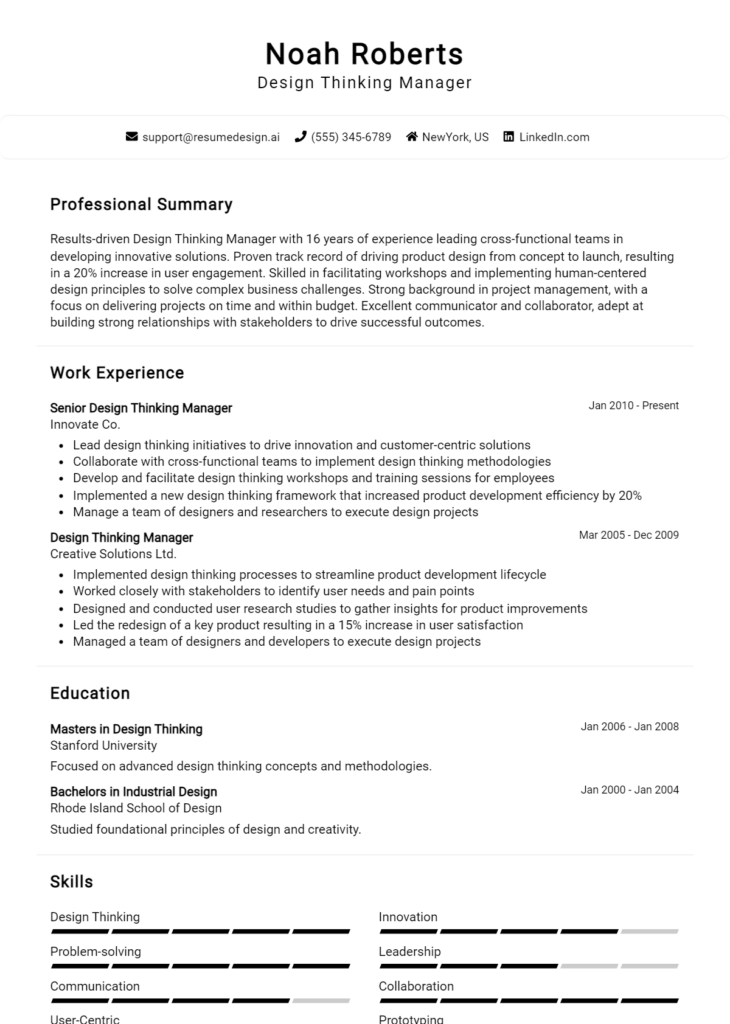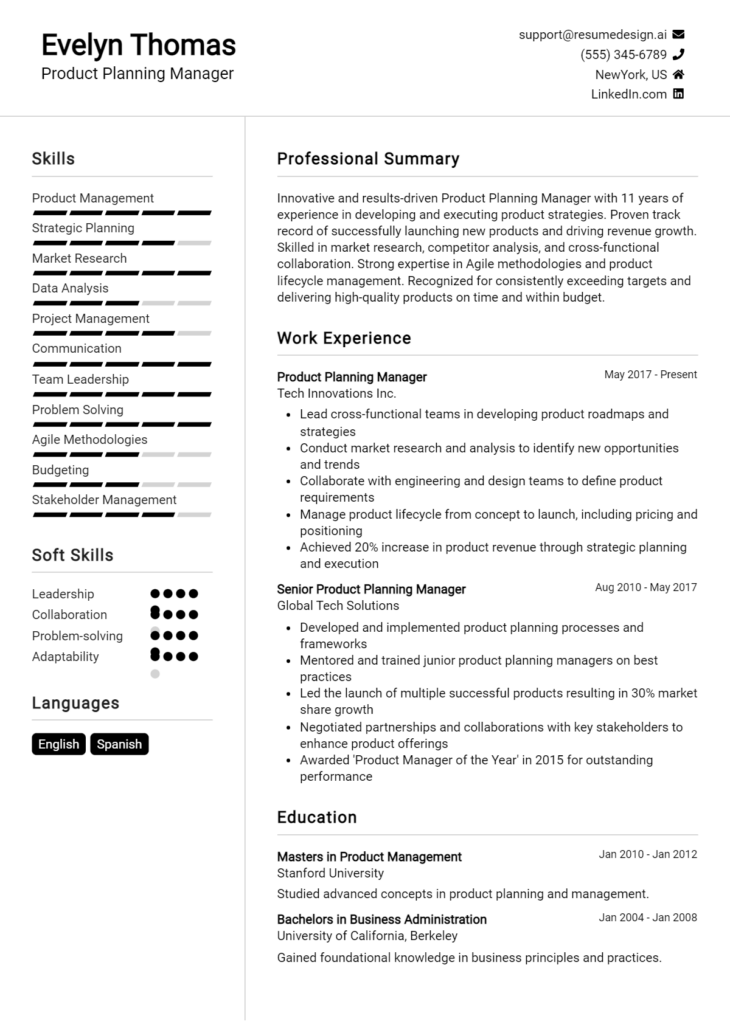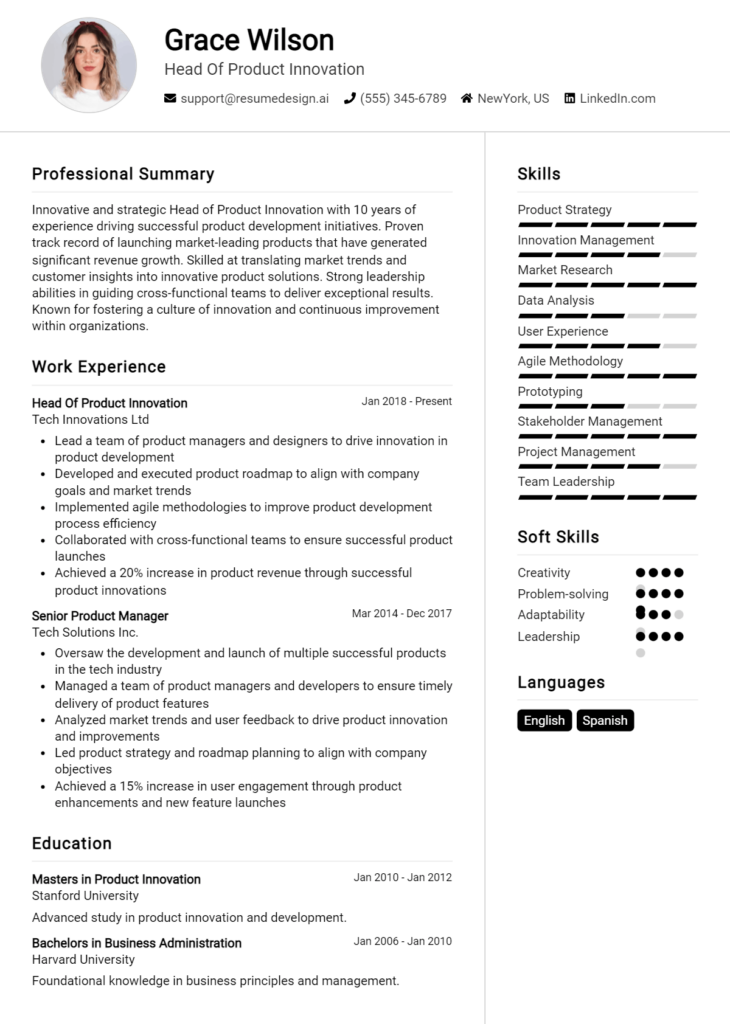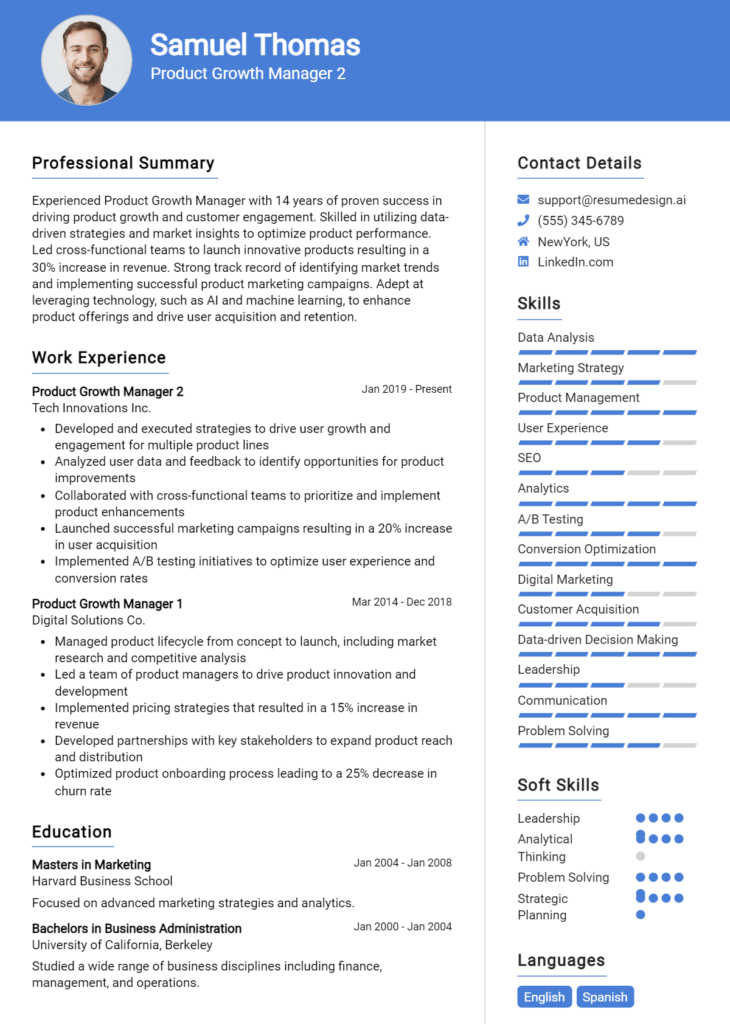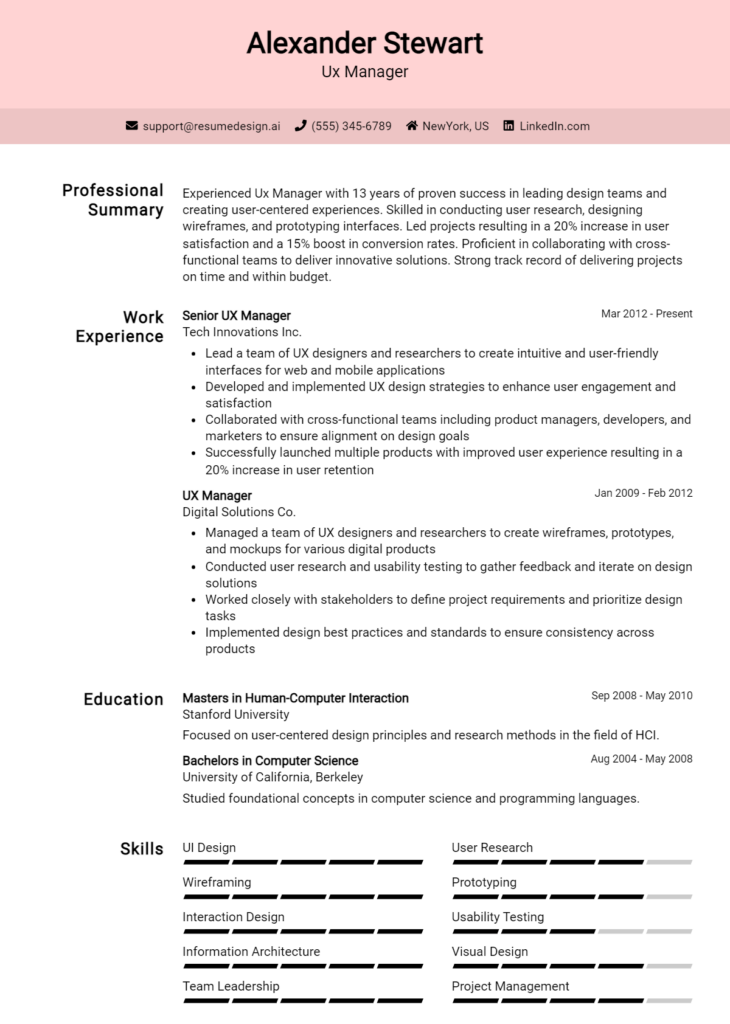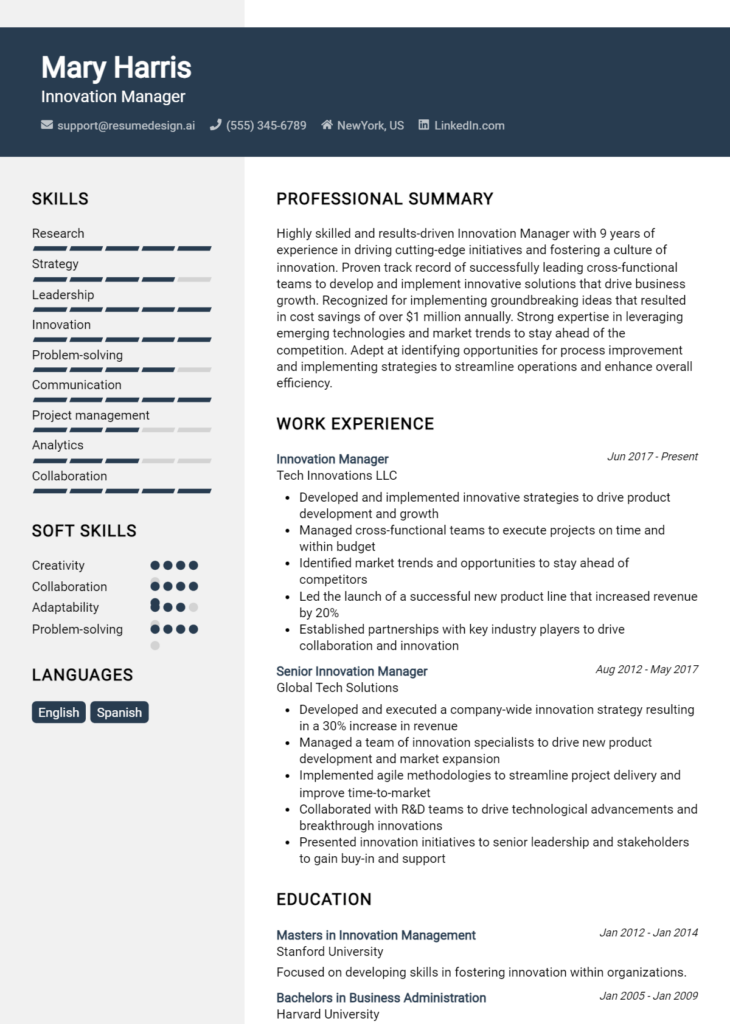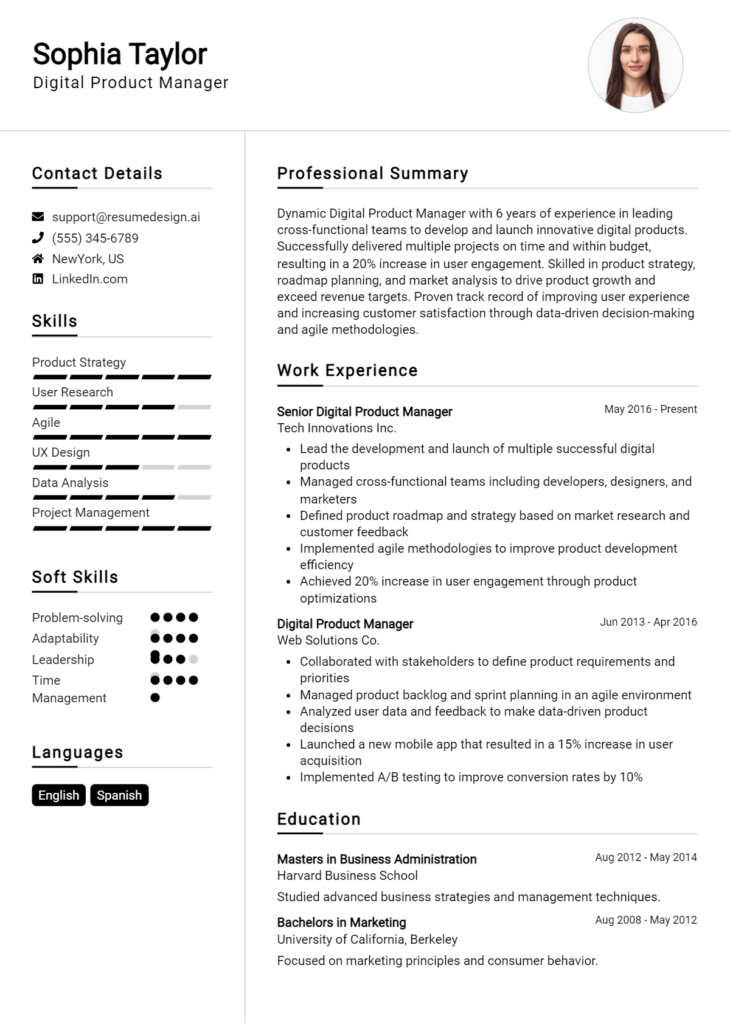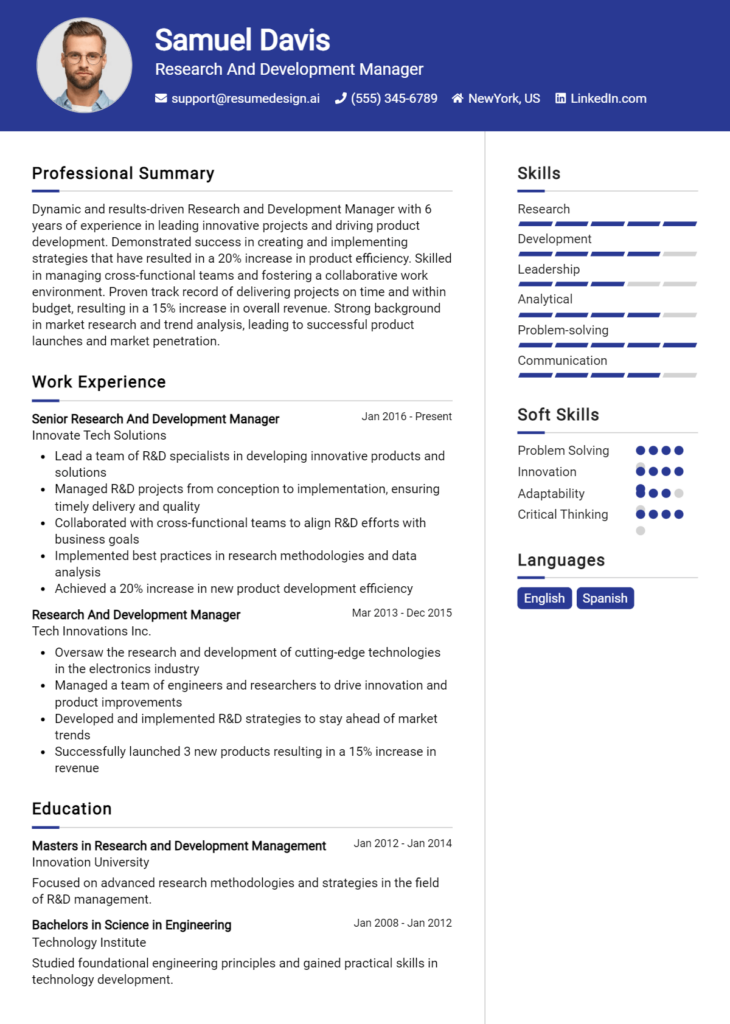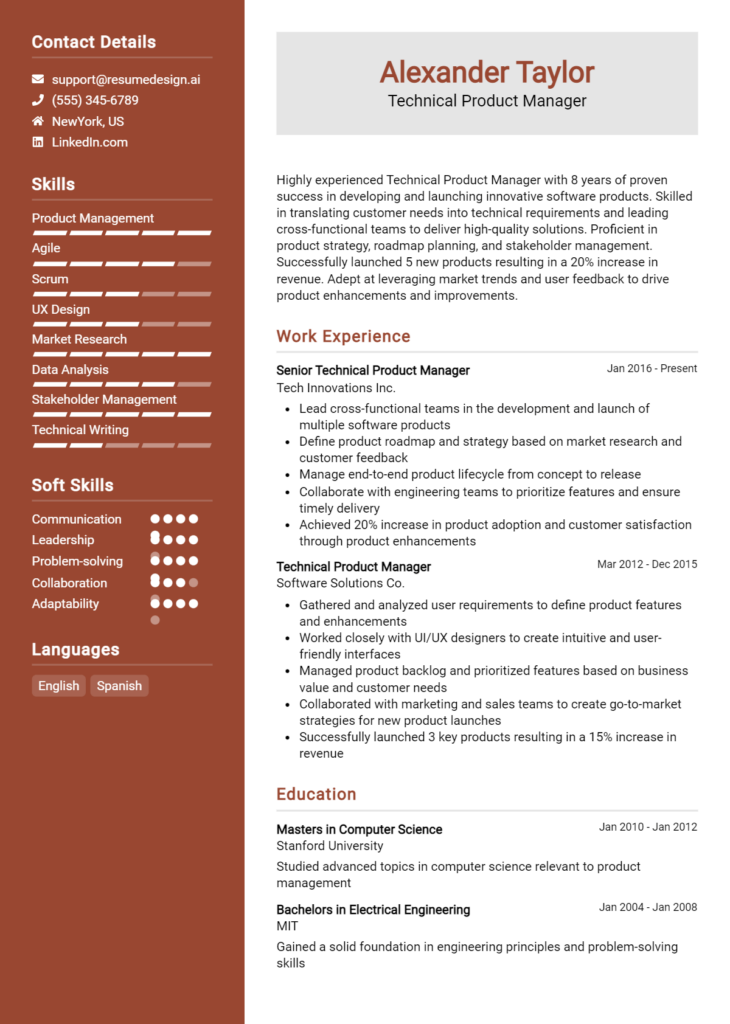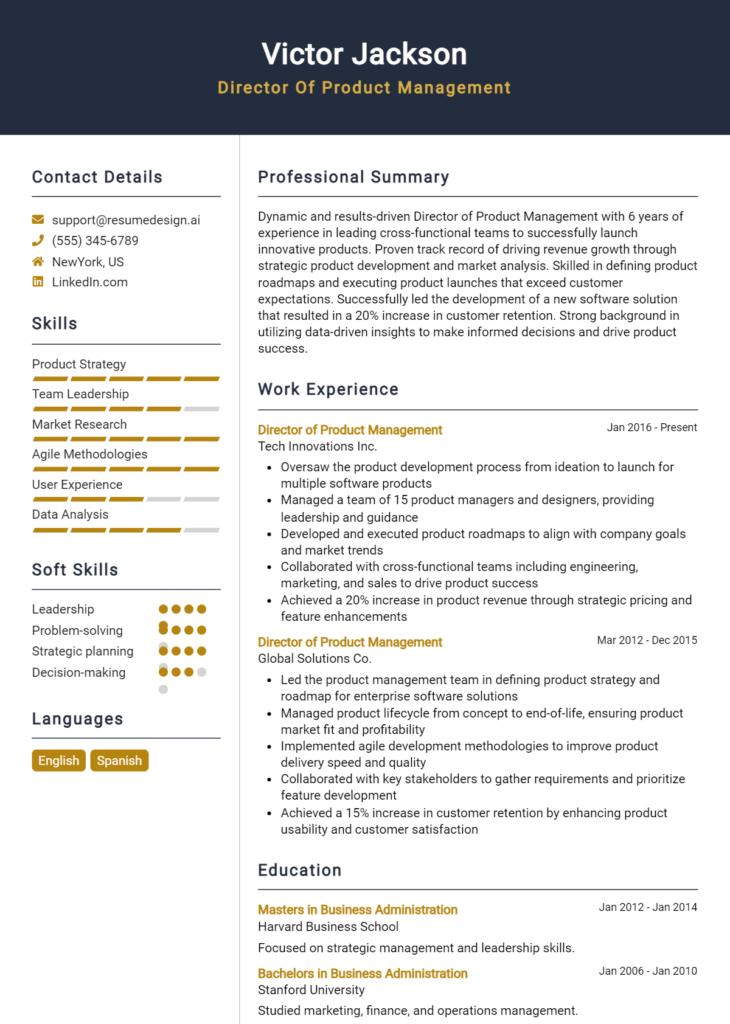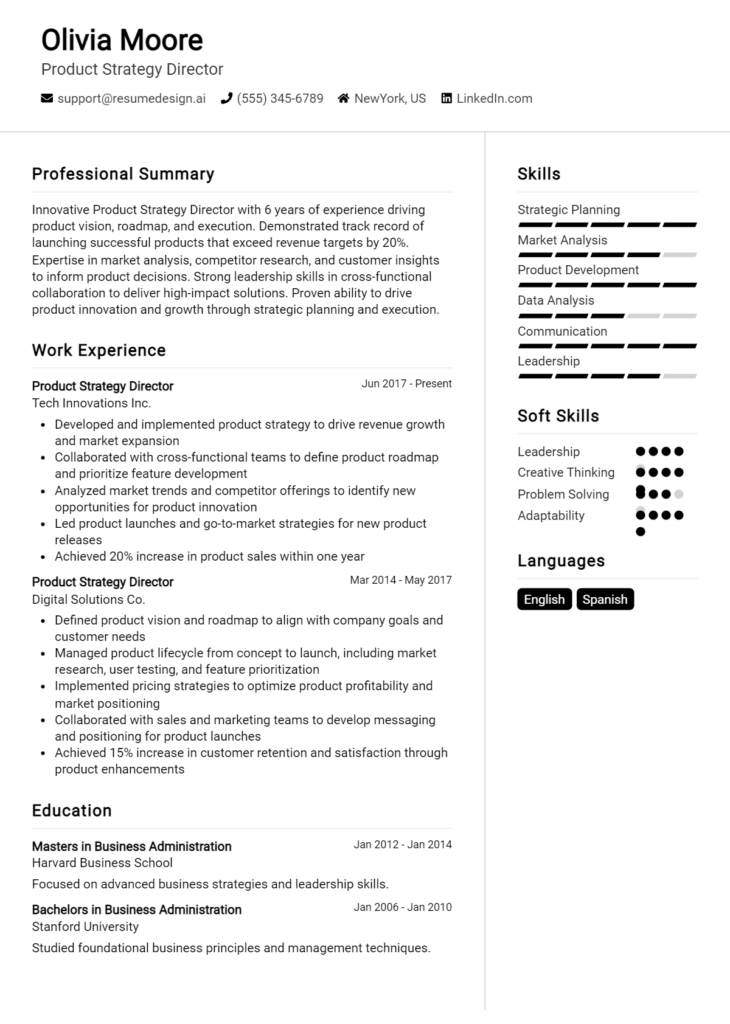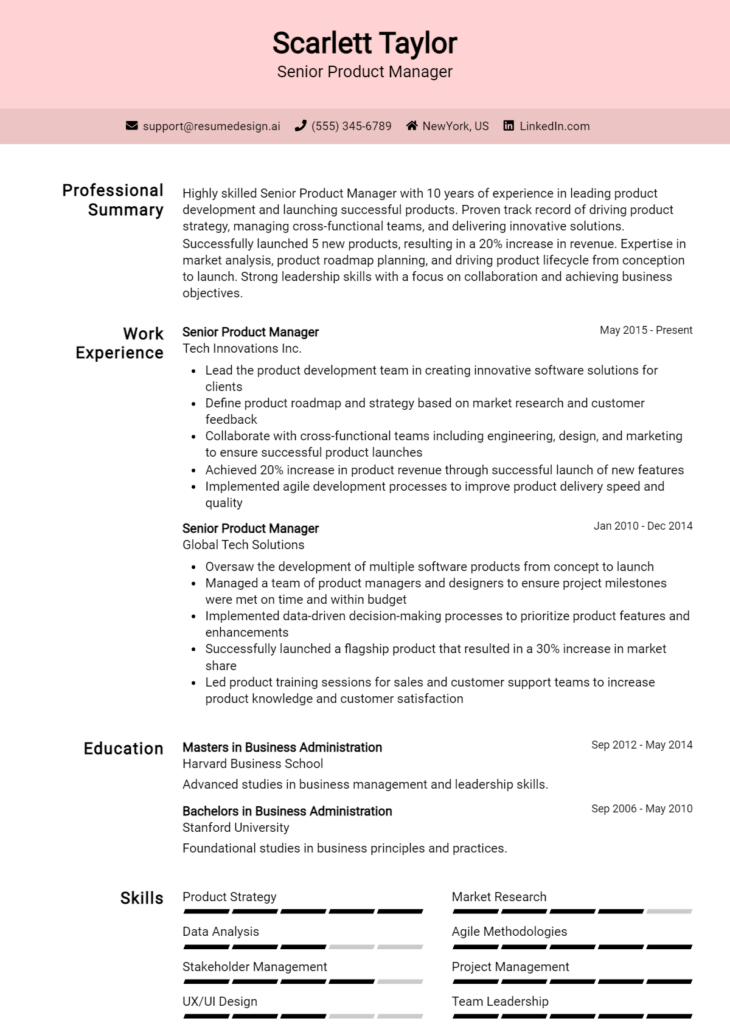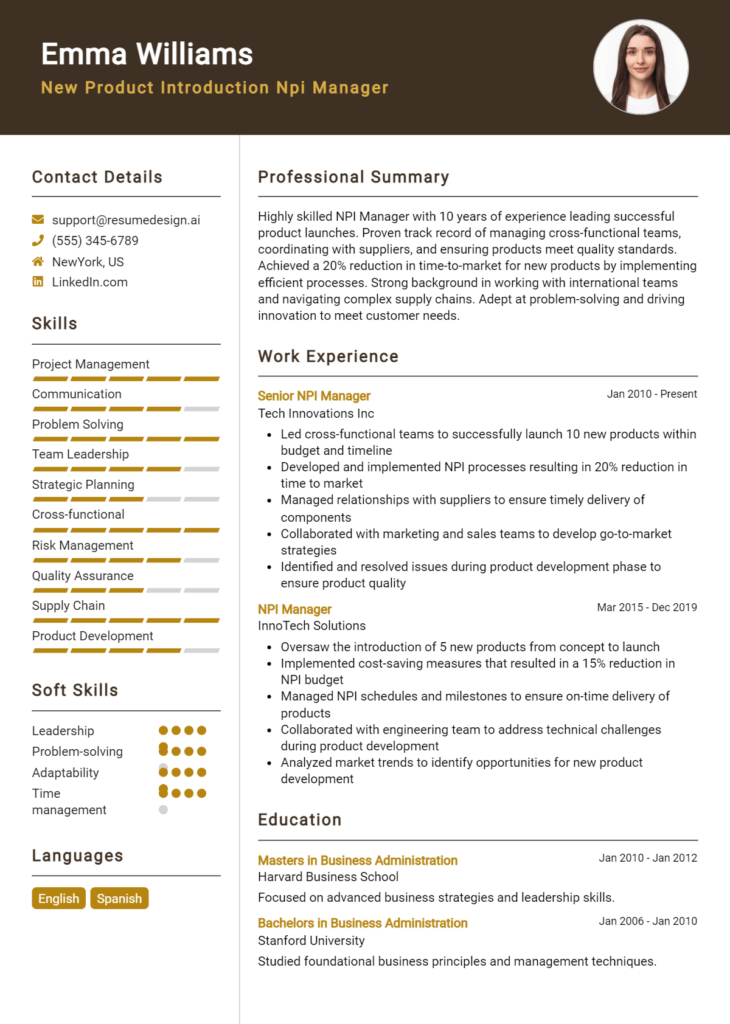Product Lifecycle Manager Core Responsibilities
A Product Lifecycle Manager is pivotal in overseeing the entire product journey, from conception to retirement. This role requires strong technical, operational, and problem-solving skills to effectively bridge departments such as R&D, marketing, and sales. By coordinating cross-functional teams, the Product Lifecycle Manager ensures alignment with organizational goals and optimizes product performance. A well-structured resume that highlights these qualifications is essential in showcasing the ability to drive product success and contribute to the company’s objectives.
Common Responsibilities Listed on Product Lifecycle Manager Resume
- Develop and manage product lifecycle strategies.
- Coordinate cross-functional teams for product launches.
- Analyze market trends and consumer feedback.
- Oversee product development and design processes.
- Ensure compliance with industry standards and regulations.
- Monitor product performance and implement improvements.
- Conduct competitive analysis and benchmarking.
- Manage product budgets and resource allocation.
- Facilitate training and support for sales teams.
- Collaborate with marketing on promotional strategies.
- Report on product lifecycle metrics to stakeholders.
- Plan product retirements and transitions effectively.
High-Level Resume Tips for Product Lifecycle Manager Professionals
In today's competitive job market, a well-crafted resume is essential for Product Lifecycle Manager professionals. This critical document often serves as the first impression a candidate makes on potential employers, making it imperative that it effectively showcases both skills and achievements. A resume that is tailored to reflect the nuances of product lifecycle management can significantly enhance a candidate's chances of standing out among a sea of applicants. In this guide, we will provide practical and actionable resume tips specifically designed for Product Lifecycle Manager professionals, ensuring you present yourself as the ideal candidate for the role.
Top Resume Tips for Product Lifecycle Manager Professionals
- Tailor your resume to each job description by incorporating relevant keywords and phrases found in the posting.
- Clearly outline your relevant experience in product development, management, and lifecycle processes.
- Quantify your achievements with specific metrics, such as percentage increases in product efficiency or revenue growth.
- Highlight your industry-specific skills, such as knowledge of Agile methodologies, market analysis, and stakeholder management.
- Include a summary statement that encapsulates your expertise and career goals in product lifecycle management.
- Showcase any certifications or courses related to product management or lifecycle strategies, such as PMP or Agile certifications.
- Utilize bullet points for readability, ensuring that each point succinctly conveys your accomplishments and responsibilities.
- Incorporate relevant software tools and technologies you are proficient in, such as PLM software, data analysis tools, or project management platforms.
- Keep your resume to one or two pages, focusing on the most relevant and impactful experiences.
- Proofread your resume thoroughly to eliminate any spelling or grammatical errors, as attention to detail is crucial in this field.
By implementing these tips, you can significantly increase your chances of landing a job in the Product Lifecycle Manager field. A well-optimized resume not only highlights your qualifications but also demonstrates your commitment to your professional growth and ability to contribute effectively to potential employers. With a strategic approach to crafting your resume, you can make a lasting impression and open the door to exciting career opportunities.
Why Resume Headlines & Titles are Important for Product Lifecycle Manager
In the competitive field of product management, a Product Lifecycle Manager must effectively showcase their expertise and experience through a compelling resume. Resume headlines and titles play a crucial role in this process, as they serve as the first impression a hiring manager has of a candidate. A well-crafted headline can grab attention and summarize a candidate's key qualifications in a single, impactful phrase. It is essential for the headline to be concise, relevant, and directly aligned with the job being applied for, ensuring that it resonates with the specific needs of the employer.
Best Practices for Crafting Resume Headlines for Product Lifecycle Manager
- Make it concise: Limit the headline to a single, powerful phrase.
- Be role-specific: Tailor the headline to reflect the specific position of Product Lifecycle Manager.
- Highlight key skills: Include the most relevant skills that align with the job description.
- Use action-oriented language: Employ strong verbs that convey leadership and initiative.
- Incorporate achievements: Mention notable accomplishments to demonstrate effectiveness.
- Focus on industry terms: Use terminology familiar to the product management field.
- Be authentic: Ensure the headline accurately reflects your unique qualifications.
- Update regularly: Revise your headline based on the specific job you are applying for.
Example Resume Headlines for Product Lifecycle Manager
Strong Resume Headlines
Dynamic Product Lifecycle Manager with 10+ Years of Experience in Driving Market Success
Results-Driven Product Lifecycle Specialist Skilled in Cross-Functional Team Leadership and Market Analysis
Innovative Product Manager with Proven Track Record of Launching Successful Products and Maximizing Profitability
Weak Resume Headlines
Looking for a Job in Product Management
Product Manager with Some Experience
The strong headlines are effective because they clearly convey the candidate's expertise, experience, and unique contributions, making them stand out in a crowded job market. They utilize specific language and highlight achievements that resonate with hiring managers. Conversely, the weak headlines fail to impress because they are vague and lack specificity, providing little insight into the candidate’s qualifications and diminishing their chances of capturing attention. A strong, targeted headline can be the difference between getting noticed or being overlooked.
Writing an Exceptional Product Lifecycle Manager Resume Summary
Crafting an exceptional resume summary is crucial for a Product Lifecycle Manager, as it serves as the first impression for hiring managers. A well-written summary not only encapsulates the candidate’s key skills and experiences but also highlights significant accomplishments that align with the job role. In a competitive job market, a strong summary can quickly capture the attention of decision-makers, demonstrating the candidate's value and relevance to the position. It should be concise, impactful, and meticulously tailored to reflect the specific job description, setting the stage for the rest of the resume.
Best Practices for Writing a Product Lifecycle Manager Resume Summary
- Quantify achievements to demonstrate impact, such as revenue growth or cost savings.
- Focus on relevant skills that align with the job description, including project management and cross-functional collaboration.
- Use industry-specific terminology to showcase familiarity with the field.
- Highlight key accomplishments that reflect your ability to manage product lifecycles effectively.
- Be concise and aim for 3-5 sentences that deliver maximum impact.
- Tailor the summary for each job application, emphasizing the most pertinent experiences.
- Incorporate action verbs to convey enthusiasm and proactivity.
- Avoid generic statements; instead, personalize the summary to reflect your unique professional journey.
Example Product Lifecycle Manager Resume Summaries
Strong Resume Summaries
Results-driven Product Lifecycle Manager with over 8 years of experience in leading cross-functional teams to launch successful products, achieving a 30% increase in market share and a 25% reduction in time-to-market.
Dynamic professional specializing in product strategy and development, with a proven track record of managing products from conception to launch, resulting in a 40% increase in customer satisfaction ratings and a 15% boost in annual revenue.
Detail-oriented Product Lifecycle Manager skilled in agile methodologies and data analysis, successfully optimizing product lines that led to a 20% reduction in costs and a 35% increase in overall profitability.
Weak Resume Summaries
Experienced manager with a background in product lifecycle management and team leadership.
Product Lifecycle Manager with skills in various aspects of product management and an interest in driving results.
The examples above illustrate the stark contrast between strong and weak resume summaries. Strong summaries are effective because they provide quantifiable results and specific skills directly related to the Product Lifecycle Manager role, showcasing the candidate's impact and expertise. In contrast, weak summaries lack detail, specificity, and measurable outcomes, making them forgettable and less compelling to hiring managers.
Work Experience Section for Product Lifecycle Manager Resume
The work experience section of a Product Lifecycle Manager resume is crucial for illustrating the candidate's capability to oversee the entire lifecycle of a product, from conception to launch and beyond. This section is where candidates can demonstrate their technical skills, ability to lead and manage cross-functional teams, and commitment to delivering high-quality products that meet market needs. By quantifying achievements and aligning their experience with industry standards, candidates can effectively showcase their impact and value to prospective employers.
Best Practices for Product Lifecycle Manager Work Experience
- Highlight relevant technical skills specific to product lifecycle management, such as Agile methodologies, market analysis, and product roadmapping.
- Quantify achievements with metrics, such as sales growth percentages, cost reductions, or time-to-market improvements.
- Emphasize collaboration with cross-functional teams, illustrating how teamwork led to successful product launches.
- Use action verbs to convey a strong sense of initiative and leadership in past roles.
- Tailor experiences to align with the job description, focusing on relevant responsibilities and accomplishments.
- Include industry-specific terminology to demonstrate familiarity with the field and its standards.
- Showcase continuous improvement efforts, such as processes implemented that enhanced product quality or team efficiency.
- Provide context around challenges faced and how they were overcome to illustrate problem-solving capabilities.
Example Work Experiences for Product Lifecycle Manager
Strong Experiences
- Led a cross-functional team to launch a new software product, resulting in a 30% increase in customer acquisition within the first quarter.
- Streamlined product development processes, reducing time-to-market by 25% and saving the company $200,000 annually.
- Conducted market research that identified key consumer needs, directly contributing to a product redesign that boosted sales by 40%.
- Implemented Agile project management practices, improving team collaboration and project delivery timelines by 15%.
Weak Experiences
- Worked on various projects related to product management.
- Assisted in team meetings and contributed to product discussions.
- Helped with product launches, but did not track results.
- Participated in some market research activities.
The examples provided illustrate a clear distinction between strong and weak experiences. Strong experiences detail specific achievements that are quantifiable and demonstrate leadership and collaboration, making a compelling case for the candidate's qualifications. In contrast, weak experiences lack detail and measurable outcomes, failing to convey the candidate's impact or expertise in product lifecycle management.
Education and Certifications Section for Product Lifecycle Manager Resume
The education and certifications section of a Product Lifecycle Manager resume plays a crucial role in establishing the candidate's qualifications and expertise in the field. This section not only showcases the candidate's academic background but also emphasizes their commitment to continuous learning through industry-relevant certifications. By detailing relevant coursework, specialized training, and recognized credentials, candidates can significantly enhance their credibility and demonstrate their alignment with the specific demands of the Product Lifecycle Manager role. A well-crafted education and certifications section can differentiate candidates in a competitive job market, making it an essential component of the resume.
Best Practices for Product Lifecycle Manager Education and Certifications
- Include degrees relevant to product management, engineering, or business administration.
- List certifications from recognized industry bodies, such as Certified Product Manager (CPM) or Certified Scrum Product Owner (CSPO).
- Highlight any specialized training programs that focus on product lifecycle management or related methodologies.
- Provide context by mentioning relevant coursework that aligns with key responsibilities of a Product Lifecycle Manager.
- Use clear formatting to make the education and certifications section easy to read and navigate.
- Prioritize recent and updated qualifications to reflect ongoing professional development.
- Avoid listing irrelevant or outdated qualifications that do not pertain to the role.
- Consider including any honors or recognitions received during educational pursuits to further enhance credibility.
Example Education and Certifications for Product Lifecycle Manager
Strong Examples
- MBA in Product Management, University of Pennsylvania, Wharton School (2021)
- Certified Product Manager (CPM), Association of International Product Marketing and Management (2022)
- Project Management Professional (PMP), Project Management Institute (2020)
- Advanced Product Lifecycle Management Workshop, Product Development and Management Association (PDMA) (2023)
Weak Examples
- Bachelor's Degree in English Literature, State University (2010)
- Certificate in Basic Computer Skills, Community College (2015)
- Outdated Six Sigma Green Belt Certification, (2012)
- Diploma in Fine Arts, Art Institute (2011)
The strong examples listed above are considered effective because they directly relate to the skills and knowledge required for a Product Lifecycle Manager, showcasing advanced education and industry-recognized credentials. In contrast, the weak examples reflect qualifications that are either irrelevant to the role or outdated, which do not contribute positively to a candidate's profile in the competitive landscape of product management. By focusing on strong, relevant qualifications, candidates can better position themselves for success in their job search.
Top Skills & Keywords for Product Lifecycle Manager Resume
As a Product Lifecycle Manager, showcasing the right skills on your resume is crucial to stand out in a competitive job market. Skills not only highlight your expertise but also demonstrate your ability to manage products from inception through development, launch, and eventual retirement effectively. A well-crafted resume that emphasizes both hard and soft skills can significantly enhance your chances of landing an interview. Employers are looking for candidates who can not only execute their tasks efficiently but also collaborate with cross-functional teams, understand market trends, and respond to customer feedback. By integrating relevant skills and work experience into your resume, you can present a comprehensive view of your abilities and experiences.
Top Hard & Soft Skills for Product Lifecycle Manager
Soft Skills
- Leadership
- Communication
- Problem-solving
- Time management
- Team collaboration
- Adaptability
- Strategic thinking
- Negotiation
- Creativity
- Analytical thinking
- Customer focus
- Conflict resolution
- Emotional intelligence
- Decision-making
- Relationship building
Hard Skills
- Product development methodologies
- Market analysis
- Lifecycle management tools (e.g., PLM software)
- Financial analysis and budgeting
- Data analysis and interpretation
- Project management
- Regulatory compliance
- Quality assurance processes
- Supply chain management
- User experience (UX) principles
- Technical documentation
- Competitive analysis
- Risk assessment
- Stakeholder management
- Agile and Scrum methodologies
- Product roadmapping
- Forecasting and demand planning
Stand Out with a Winning Product Lifecycle Manager Cover Letter
Dear Hiring Manager,
I am excited to apply for the Product Lifecycle Manager position at [Company Name], as advertised. With over [X years] of experience in product management and a proven track record of successfully guiding products from conception to market, I am confident in my ability to contribute to your team. My background in data analysis and customer insights, combined with my strategic approach to product development, allows me to effectively identify market opportunities and lead cross-functional teams to deliver exceptional products that meet both customer needs and business objectives.
In my previous role at [Previous Company Name], I successfully managed the lifecycle of several high-profile products, resulting in a [specific achievement, e.g., "20% increase in market share within one year"]. I worked closely with engineering, marketing, and sales teams to ensure that our product offerings were not only innovative but also aligned with customer preferences. My ability to analyze market trends and consumer feedback enabled me to make informed decisions at every stage of the product lifecycle, from ideation through launch and beyond. I am adept at utilizing various project management tools and methodologies to streamline processes and ensure timely product releases.
I am particularly drawn to the opportunity at [Company Name] because of your commitment to [specific value or initiative of the company, e.g., "sustainability and innovation in product development"]. I believe that my experience in developing environmentally friendly products and incorporating sustainable practices into the product lifecycle would be a valuable asset to your team. I am eager to bring my passion for product management and my strategic mindset to [Company Name], where I can help drive product success and enhance customer satisfaction.
Thank you for considering my application. I look forward to the possibility of discussing how my skills and experiences align with the goals of [Company Name]. I am enthusiastic about the opportunity to contribute to your team and help shape the future of your products.
Sincerely,
[Your Name]
[Your LinkedIn Profile or Website]
[Your Contact Information]
Common Mistakes to Avoid in a Product Lifecycle Manager Resume
When crafting a resume for a Product Lifecycle Manager position, it's crucial to present your skills and experiences effectively, as this role demands a comprehensive understanding of product strategy, development, and market dynamics. However, many candidates fall into common pitfalls that can detract from their qualifications. Here are some mistakes to avoid to ensure your resume stands out for all the right reasons:
Vague Job Descriptions: Failing to provide specific details about your previous roles can leave hiring managers unclear about your contributions. Use quantifiable achievements to highlight your impact.
Ignoring Keywords: Many companies use applicant tracking systems (ATS) to filter resumes. Not including relevant keywords from the job description can lead to your resume being overlooked.
Lack of Focus on Results: Simply listing responsibilities without showcasing outcomes can weaken your resume. Focus on how your actions led to measurable improvements or successes in product management.
Overemphasis on Technical Skills: While technical expertise is important, a Product Lifecycle Manager role also requires strong leadership and communication skills. Balance your resume by highlighting both areas.
Not Tailoring the Resume: Sending a generic resume can hurt your chances. Tailor your resume to each job application by aligning your experience with the specific requirements of the role.
Omitting Soft Skills: The ability to collaborate with cross-functional teams is essential in product management. Be sure to include soft skills that demonstrate your ability to work effectively with others.
Poor Formatting: A cluttered or hard-to-read resume can detract from your qualifications. Use clear headings, bullet points, and consistent formatting to enhance readability.
Neglecting Continuous Learning: The field of product management is always evolving. Failing to include recent training, certifications, or relevant courses can make your resume appear stagnant.
Conclusion
In conclusion, the role of a Product Lifecycle Manager is pivotal in steering products from conception to retirement. Key takeaways include the importance of understanding market trends, collaborating with cross-functional teams, and developing strategies that enhance product value throughout its lifecycle. A successful Product Lifecycle Manager must also be adept in data analysis, customer feedback interpretation, and project management to drive product success.
As you reflect on your own qualifications and experiences in this field, consider reviewing and updating your resume to best highlight your skills and achievements. To assist you in this process, take advantage of valuable resources available online. Explore resume templates to find a format that suits your style, use the resume builder for a streamlined experience, and check out resume examples for inspiration. Additionally, don’t overlook the importance of a strong introduction; utilize cover letter templates to make a compelling case for your candidacy. Start refining your resume today and position yourself for success in your career as a Product Lifecycle Manager!

